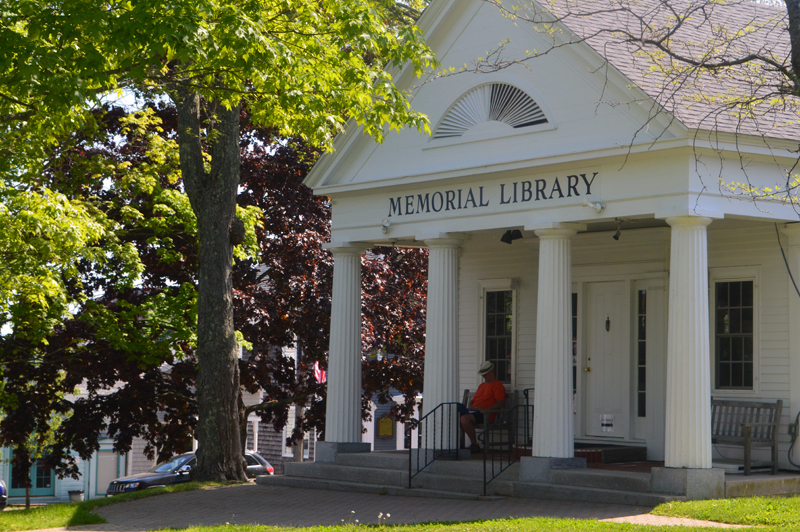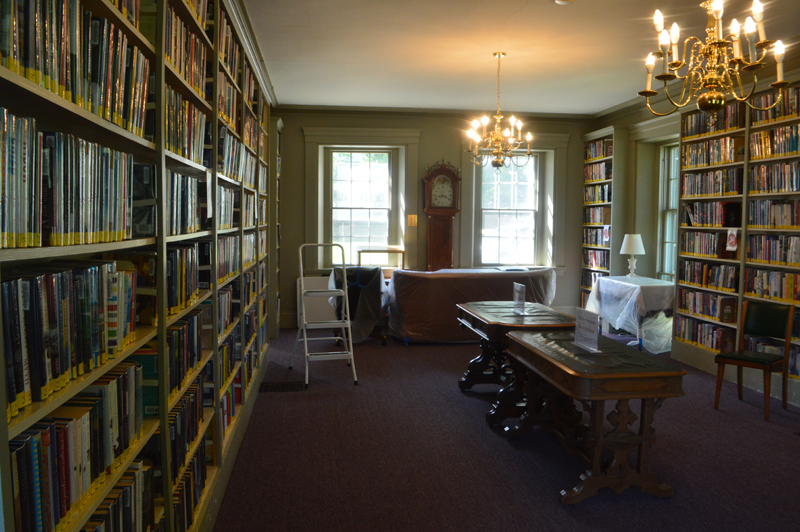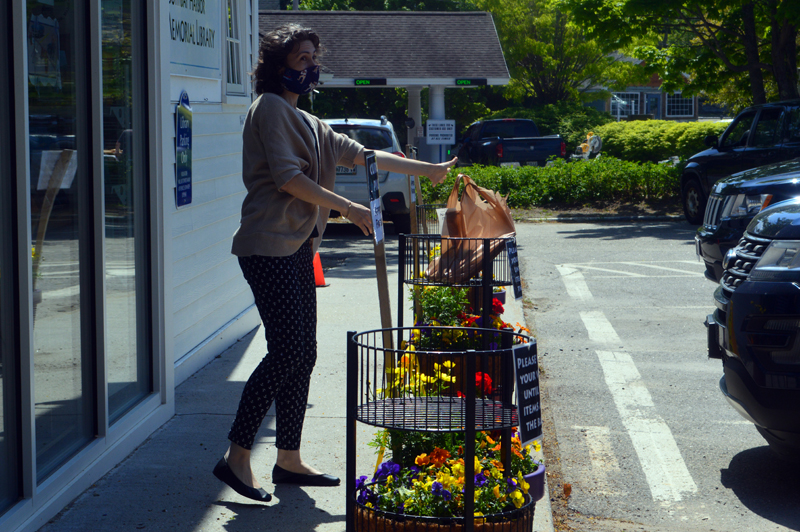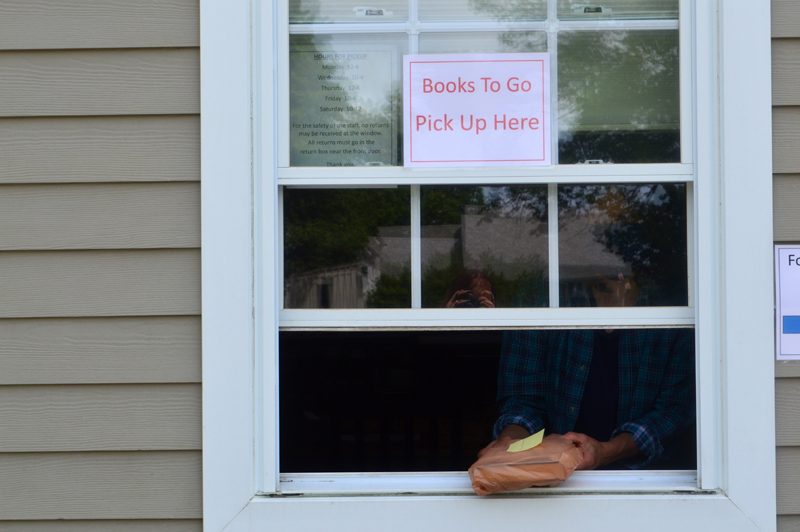
A visitor makes use of the Wi-Fi outside Boothbay Harbor Memorial Library. Across Maine, libraries have continued to provide free internet access to the public. (Alyce McFadden photo)
Joanna Breen, executive director of Boothbay Harbor Memorial Library, joked that the restrictions on public gatherings in place due to COVID-19 have almost been a dream come true for librarians – the shelves are neat, the reading rooms are quiet.
Almost, but not quite.
“Maintaining control is what librarians are great at,” Breen said with a laugh. “But working in the building without people in it was pretty depressing, frankly. It was just so boring without patrons.”
Boothbay Harbor Memorial Library launched a curbside pickup service June 2, and Breen and her staff have choreographed comprehensive safety protocols.
Anyone with a library card can choose books to borrow on the library’s website. Orders are processed within two days. When the books are ready, a librarian dons gloves and a mask and places the books at a contactless pickup station in the library’s parking lot, which library staff has decorated with flowers and cartoon signs.
“We wanted to make it as friendly as possible even as we tell people ‘Hey, keep your distance,’” Breen said.
In its first three days of curbside service, the library filled more than 50 individual orders from appreciative Boothbay region residents.
“We’re doing this so that they can have a sense of normalcy, as much as possible,” Breen said. “People really want to read and to connect with their communities.”

Furniture in the Wiscasset Public Library reading room is covered in plastic and pushed aside to discourage patrons from lingering. The library’s full collection is open to the public for in-person browsing. (Alyce McFadden photo)
According to Maine State Librarian Jamie Ritter, most of the state’s libraries opted to start filling orders for pickup last week, but a handful have chosen to open their doors for indoor browsing and borrowing.
Among this small cohort is the Wiscasset Public Library, which began welcoming patrons back into its collections June 2.
“A lot of readers are shelf browsers. They want to see the dust covers and they want to see all the new releases,” Director Pam Dunning said. “You can’t do any of that if you’re not in the building.”
Wiscasset patrons can also use one of the library’s three desktop computers, a resource many community members rely on for everything from printing out tax forms to applying for jobs.
To keep patrons safe, Dunning and her staff arrive at the library an hour before it opens to sanitize everything with a cleaning agent called Pure Green 24.
At all libraries, whether entirely open or for pickup only, any book that a patron touches must be “quarantined” in either a secure room or on a designated cart for between three days and a week.
The 17-member Maine Library Commission, appointed by the governor, has worked to provide Maine librarians with as much advice as it can gather to help them reopen their libraries safely. The commission has looked for guidance from the state and from the Institute for Museum and Library Services in Washington, D.C.

Desiree Scorcia, deputy director of community engagement and nonprofit management at the Boothbay Harbor Memorial Library, places a bundle of books in the library’s parking lot for contactless pickup. (Alyce McFadden photo)
According to Ritter, the Maine State Library is looking forward to a forthcoming report from the Battelle Memorial Institute – a nonprofit research organization based in Ohio – on how long the coronavirus can survive on various library materials, including books, newspapers, keyboards, and CDs.
Meanwhile, the Maine State Library has been hosting weekly Zoom meetings so Maine librarians can trade tips and swap questions in real time. According to Ritter, attendance has often totaled between 200 and 300 librarians.
“Maine librarians do love talking to each other,” Breen said.
In these meetings, the librarians discuss how to provide the many community services public libraries provide in addition to book lending. When libraries closed in mid-March, the Maine Library Commission recommended that they continue to provide free Wi-Fi and encouraged them to invest in Wi-Fi extenders so the public could access the internet outside the buildings or in cars parked in library grounds.
“It’s not uncommon for me to come outside and have someone sitting right outside the door on their computer,” said Cathrina Skov, director of the Waldoboro Public Library.
Breen said she has helped patrons conduct research by phone, while Skov has provided printing services during the library’s closure, using the library’s printer, then leaving the printed materials for pickup outside the building’s door.
In Boothbay Harbor, the library has issued more than 300 library cards to local elementary and high school students, which they can use to borrow physical books or read online through the e-book service Hoopla while school libraries are shuttered.

Cathrina Skov, director of the Waldoboro Public Library, passes a bag of books through her library’s curbside pickup window. The library has been offering curbside service since May 12. (Alyce McFadden photo)
Though it has yet to announce plans to reopen or provide curbside pickup, Skidompha Library in downtown Damariscotta has been publishing daily videos of children’s librarian Jessie Trafton reading picture books on the library’s Facebook page, in addition to virtual tours of historical sites, educational YouTube videos, and recipes for healthy snacks.
The coronavirus crisis has forced libraries to adapt in more general ways, too. Ritter said that, during prior crises, libraries were centers for physical gathering and communal shelter.
“But in the pandemic, our charge really was to educate our communities about why staying home was so important,” Ritter said. “We became community educators.”
The pandemic has also posed a serious financial threat to libraries. Sharp declines in income tax revenue mean some towns have less money to allocate to local libraries, and restrictions on public gatherings prevent libraries from holding fundraisers they normally rely on to fill budget gaps.
Though Waldoboro has yet to finalize its budget allocations, Skov expects the library to lose upward of $12,000 in income from the town. If the library can’t hold fundraising events in the fall to make up those canceled during the summer, Skov and her staff could be in trouble.
It’s still too soon to say for sure, but Skov is starting to plan for a worst-case scenario.
“Hours and acquisitions are really the only two places we have any flexibility in the budget,” she said. “The rest is plumbing, heating, electricity.”
Amid these concerns, librarians are eager to get back to serving their communities in the extraordinary, everyday ways they are accustomed to.
“We’re going to be back as soon as we can in that role of convening communities in a uniquely equitable way,” Ritter said.
Lincoln County Libraries: Hours and Protocols
Boothbay Harbor Memorial Library: curbside service by appointment, Tuesday-Saturday.
Bremen Library: curbside service by appointment, Tuesday and Friday.
Bridge Academy Public Library, Dresden: information not available.
Bristol Area Library: Curbside service by appointment; in-person browsing available in 30-minute intervals by appointment, Monday and Friday.
Monhegan Memorial Library: “Come and pick up your book on the porch!” by appointment; in-person reopening tentatively planned for July 1.
Rutherford Library, South Bristol: information not available.
Skidompha Library, Damariscotta: closed, with remote programs and services available at skidompha.org.
Southport Memorial Library: Curbside service for DVDs only by appointment, 11 a.m. to 3 p.m. Tuesday and Thursday. Curbside service for books scheduled to begin June 16.
Waldoboro Public Library: Curbside service, Monday-Saturday.
Wiscasset Public Library: Curbside service by appointment; in-person browsing, Tuesday-Saturday.






